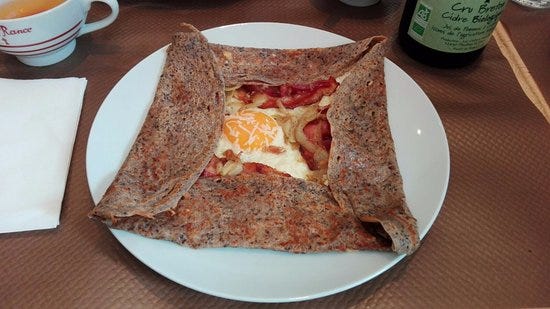Back in the mid-seventies I trained as a chef at the British Columbia Institute of Technology (BCIT). The instructors were mostly European, and the curriculum was based on classical French cuisine. Which, at its most basic, meant lots of meat and lots of heavy, sticky cream based sauces. Bechamel with a vengeance.
At the same time that we were learning this post-war cuisine, chefs in France were inventing the antithesis: La Nouvelle Cuisine.
"La nouvelle cuisine représente l'évolution de la cuisine dans les années 1970, c'est le mai 68 de la cuisine, c'est la liberté", assure le chef Yves Camdeborde. "Il faut se remettre dans le contexte de l'après-guerre, où on avait été privés de produits de luxe. On est alors tombé dans un excès de gras, le foie gras, les viandes faisandées, les marinades. Donc on était dans une cuisine lourde. Et une bande de cuisiniers, grâce à deux grands journalistes, déclenche tout un mouvement de liberté".
French food that wasn’t fat, greasy, and overwhelming. A lighter kind of French cooking that is still influencing the young chefs that we watch every night on MasterChef: The Professionals.
What I didn’t anticipate when moving to France was how rare it would be to find this calibre of food. And we have had one truly exceptional, modern dinner. It cost us a couple of hundred euros at Hostellerie des clos in Chablis. This was a meal that explained to me why I’ve never been entirely impressed with Vancouver stalwarts like West or the Hawksworth Restaurant. They’re simply not as good, although a fair part of that is because Vancouver ingredients are so ordinary compared to those in France.
Sadly though almost every other restaurant meal that we’ve had in France was heavy, over-sauced, and heavily, heavily salted. I’m talking about an average Plat du Jour lunch, or dinner at an ordinary Brasserie. It’s like the last fifty years of the development of French cooking just passed people by, and they remained stuck in 1972.
(As an aside, I can’t recall the last time that I saw a Vancouver menu that didn’t have a couple of vegetarian or even vegan items. In France it feels as if non-meat food is just not a thing that has been developed. Perhaps in larger centres like Paris you can find it, but not in rural locations. And often you can’t even find salad without big chunks of meat and cheese on top of it. Or lardons…)
Even more sad for me are the vegetables. This is country where we have delighted in how fresh and flavourful the vegetables have been. They are a true delight to cook with and eat, but the restaurants we’ve visited still seem to belong to the “boil it to death” school of vegetable cookery. It’s just sad.
And again, I’m sure that high-end Michelin starred restaurants aren’t like this, but when you just want a quick lunch during a weekday it’s pretty sad.
So for lunches now on the road we hit up a charcuterie in the morning for paté and thin-sliced ham, and some cheese. We stop at the boulangerie for a baguette and some sweet treats for dessert. Suddenly lunch in the car is a gourmet delight.
One new delight though is the food pictured at the top. A gallette is a buckwheat pancake filled with just about anything you like, and is not be missed.






You've definitely pinned it with the quality of ingredients. Even our finest of fine over here will never compare. The lack of vegetarian fair, however, IS likely comparable to what you'd find in villages and small communities here in Canada as well. By that, I mean mostly brown or white, sauces, deep fried, cheeses and salt. Alas, the finest fair in the world for ingredients doesn't mean the chef will be too notch. If they're in a smaller town rather than a city, running a luncheon for convenience and a paycheque only, chances are they didn't attend culinary school, let alone one left in the dust of the 1970's. They are there to serve a local population that must have been indicative of their preference for old school pallettes, possibly even reminiscent of comfort food to them.
That being said, I personally adore the fact that this has forced your hand to your own creations while on the move. An adventure awaits you with each mouthful this way 👌
Curiously, do the two of you enjoy cooking in your temporary abode over there? If so, what sorts of delicacies do you prepare yourself and how are you finding the cost, availability and freshness of groceries by comparison?
Lending to another query, tell us about the community you're in. Population, average temperatures, primary resources, employment and educational opportunities, average age?